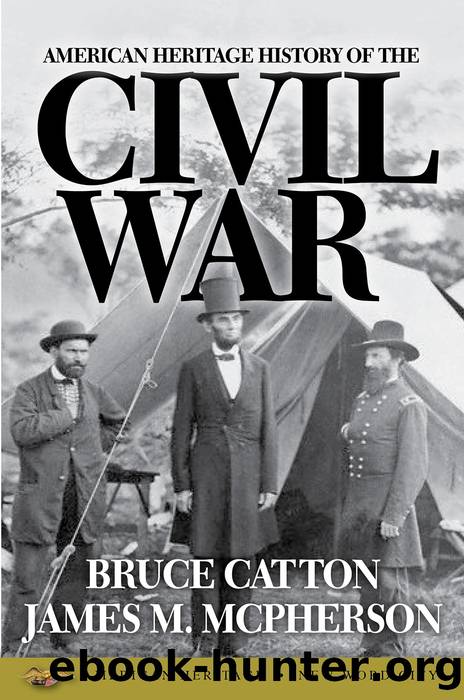American Heritage History of the Civil War by Bruce Catton

Author:Bruce Catton [Bruce Catton and James M. Mcpherson]
Language: eng
Format: epub
Tags: History/United States/Civil War
ISBN: 9781612307909
Publisher: New Word City, Inc.
Published: 2014-06-08T16:00:00+00:00
The statesmen and diplomats did their best to control and direct the war, but the real load was carried from first to last by the ordinary soldier. Poorly trained and cared for, often poorly led, he was unmilitary but exceedingly warlike. A citizen in arms, incurably individualistic even under the rod of discipline, combining frontier irreverence with the devout piety of an unsophisticated society, he was a sentimentalist with an inner core as tough as the heart of a hickory stump. He had to learn the business of war as he went along because there was hardly anyone on hand qualified to teach him, and he had to pay for the education of his generals, some of whom were all but impossible to educate. In many ways, he was just like the soldiers of modern days, but he lived in a simpler era, and when he went off to war, he had more illusions to lose. He lost them with all proper speed, and when the faint of heart and weaklings had been winnowed out, he became one of the stoutest fighting men the world has ever seen. In his own person, he finally embodied what the war was all about.
The first point to remember about him is that, at least in the beginning, he went off to war because he wanted to go. In the spring of 1861, hardly any Americans in either section had any understanding of what war really was like. The Revolution was a legend, the War of 1812 had been no more than an episode, and the war with Mexico had never gone to the heart. Right after Fort Sumter, war looked like a great adventure, and the waving flags and the brass bands and the chest-thumping orators put a gloss of romance over everything; thousands upon thousands of young Northerners and Southerners hastened to enlist, feeling that they were lucky to have a chance. Neither government was able to use all of the men who crowded the recruiting stations in those first glittering weeks, and boys who were rejected went back home with bitter complaints. Men who went off to camp were consumed with the fear that the war might actually be over before they got into action - an emotion they recalled a year later with wry grins.
In the early part of the war, the camps that received these recruits were strikingly unlike the grimly efficient training camps of the twentieth century. There were militia regiments that hired civilian cooks and raised mess funds to buy better foods than the government provided. In the South, a young aristocrat would as likely as not enlist as a private and enter the army with a body servant and a full trunk of spare clothing, and in the North, there were volunteer regiments that were organized somewhat like private clubs - a recruit could be admitted only if the men who were already in voted to accept him. In both sections, the early regiments were loaded down with baggage, as well as with many strange notions.
Download
This site does not store any files on its server. We only index and link to content provided by other sites. Please contact the content providers to delete copyright contents if any and email us, we'll remove relevant links or contents immediately.
| Africa | Americas |
| Arctic & Antarctica | Asia |
| Australia & Oceania | Europe |
| Middle East | Russia |
| United States | World |
| Ancient Civilizations | Military |
| Historical Study & Educational Resources |
The Bomber Mafia by Malcolm Gladwell(1180)
Submerged Prehistory by Benjamin Jonathan; & Clive Bonsall & Catriona Pickard & Anders Fischer(1162)
Facing the Mountain by Daniel James Brown(1131)
The Dawn of Everything by David Graeber & David Wengrow(1105)
The Way of Fire and Ice: The Living Tradition of Norse Paganism by Ryan Smith(1032)
Wandering in Strange Lands by Morgan Jerkins(1014)
Driving While Brown: Sheriff Joe Arpaio Versus the Latino Resistance by Terry Greene Sterling & Jude Joffe-Block(1002)
Tip Top by Bill James(1002)
Evil Geniuses: The Unmaking of America: A Recent History by Kurt Andersen(999)
Red Roulette : An Insider's Story of Wealth, Power, Corruption, and Vengeance in Today's China (9781982156176) by Shum Desmond(997)
F*cking History by The Captain(966)
It Was All a Lie by Stuart Stevens;(940)
White House Inc. by Dan Alexander(904)
Evil Geniuses by Kurt Andersen(901)
Treasure Islands: Tax Havens and the Men who Stole the World by Nicholas Shaxson(879)
American Dreams by Unknown(857)
American Kompromat by Craig Unger(847)
The Fifteen Biggest Lies about the Economy: And Everything Else the Right Doesn't Want You to Know about Taxes, Jobs, and Corporate America by Joshua Holland(816)
The First Conspiracy by Brad Meltzer & Josh Mensch(811)
